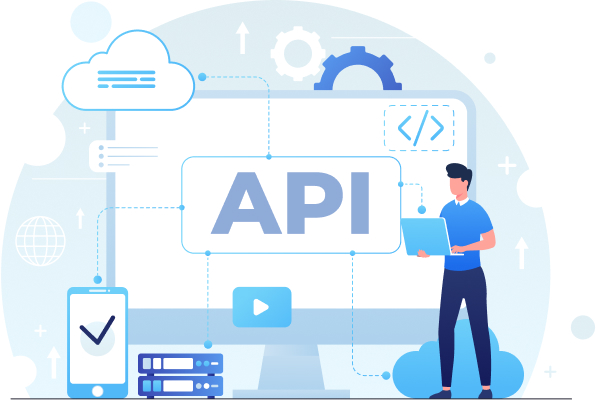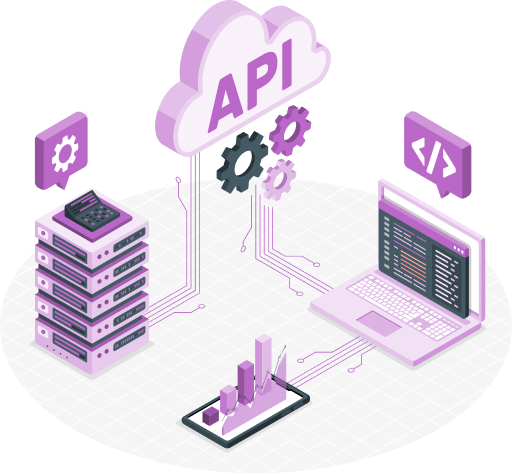Custom API Development Services
We specialize in customizable API development services tailored to your unique requirements. Whether you need a simple application integration or a complex, data-driven solution, we deliver services designed to meet and exceed your expectations.
API Consulting
Our team guides you through the complexities of APIs, helping you develop a strategic plan to optimize performance and drive revenue growth.
API Management
From design to deployment, we handle every aspect of API management, including publishing, securing, monitoring, and analyzing, to ensure seamless operation.
API Implementation & Support
We streamline the implementation and integration process, providing continuous support to keep your APIs running smoothly and efficiently.
Microservices Development
Our experts design scalable and resilient microservices architectures, enabling flexible APIs that tackle intricate workflows with minimal downtime.
Legacy API Modernization
We modernize legacy systems, enhancing process flexibility with cross-platform compatibility and modular services tailored to specific domains.
Why Choose Us
Our comprehensive, feature-rich solutions consistently lead the market. By choosing our API development services, you’ll gain access to the following advantages:
Enhanced System Scalability
APIs enable seamless scaling by allowing individual system components to expand or contract without affecting the entire system. Adding new servers becomes effortless, as APIs manage communication without requiring changes to your website code, maintaining both performance and reliability.
Flexible System Updates
APIs serve as a bridge for developers to interact with systems using defined tools and protocols. This structure facilitates flexible updates, enabling the addition of new features and capabilities without interrupting the existing system.
Accelerated Marketability
APIs simplify creating marketplaces by connecting buyers and sellers efficiently. They also support integrations between platforms, streamlining data transfer and enhancing user experiences across systems.
Reduced Development Costs
By abstracting complex functionalities, APIs allow developers to focus on data exchange rather than intricate implementation details. This results in faster, more efficient application development, significantly reducing costs.
Improved Developer Experience
APIs streamline development by granting easy access to functionalities of other software systems. Developers can focus on innovation and feature enhancement, reducing the time spent on repetitive coding tasks.
Resilient and Fault-Tolerant Systems
By facilitating communication between different software components, APIs enhance system fault tolerance. They ensure continuity and high availability even in the face of component failures, creating more reliable and robust systems.
A Comprehensive Guide to API Development
APIs (Application Programming Interfaces) are the backbone of modern digital ecosystems, enabling seamless communication between applications and systems. This guide delves into the essentials of API development, covering key concepts, best practices, and practical steps to design, implement, and manage APIs effectively. Whether you're building a simple integration or a complex system architecture, this guide will provide the insights you need to create APIs that are robust, scalable, and secure.

An Overview of API Development Services
API (Application Programming Interface) development services focus on designing, managing, and maintaining APIs that facilitate seamless communication between software applications, systems, or platforms. By establishing clear rules and protocols for interaction, APIs enable developers to access and leverage specific functionalities and data from existing applications or services efficiently.
Various Types of APIs
-
Web APIs
Web APIs enable communication between web applications or services over the internet. They provide access to specific resources or features using standard protocols like HTTP.
-
REST APIs
Representational State Transfer (REST) APIs adhere to a set of architectural principles, using HTTP methods such as GET, POST, PUT, and DELETE to interact with resources. REST APIs typically exchange data in JSON or XML formats, offering simplicity and flexibility.
-
SOAP APIs
Simple Object Access Protocol (SOAP) APIs rely on a robust protocol for structured data exchange. They use XML for formatting messages and can operate over multiple transport protocols, including HTTP and SMTP, ensuring reliability in complex integrations.
-
GraphQL APIs
GraphQL is both a query language and a runtime for executing API queries. It allows clients to specify and fetch only the data they need, reducing unnecessary data transfer and improving efficiency in communication.
-
Real-time APIs
Designed for instantaneous interaction, real-time APIs enable live updates and data streaming between systems. They are essential for applications requiring immediate feedback, such as chat platforms, collaboration tools, and IoT ecosystems.
